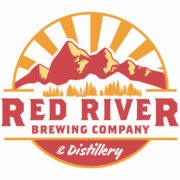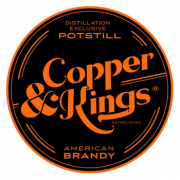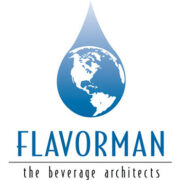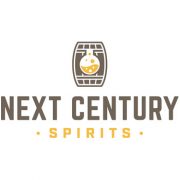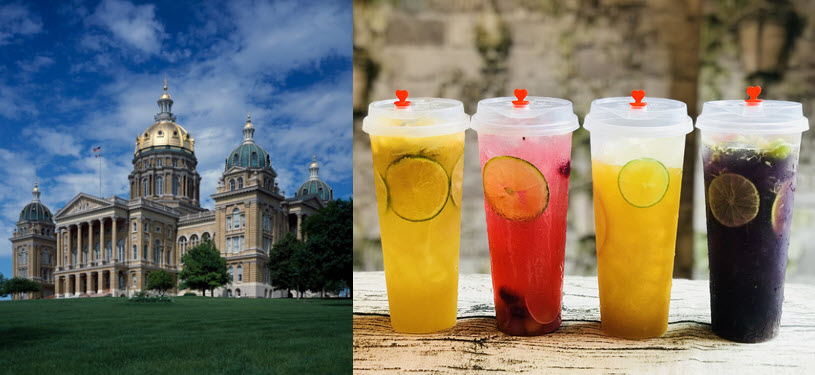
It’s no secret that the Covid-19 pandemic has been brutal on many customer facing businesses. It seems there’s not a day that goes by that you hear about another one of these businesses going out of business.
Restaurants, bars and distilleries have been particularly hard hit as they’ve been shut to welcoming guests into their businesses for months. In an effort to help these small businesses many states have enacted temporary emergency measures to allow restaurants, bars and distilleries to sell cocktails to-go. This certainly doesn’t make up for all of the lost revenue but its one way to keep customers engaged and some workers employed.
Most of these temporary rules were written with expiration dates. Unfortunately the pandemic doesn’t have an expiration date and even as these businesses are slowly allowed to open it is generally at 50% to 75% reduced capacity. Restaurant, bar and distillery owners have been asking legislatures to make these temporary rules permanent and Iowa is the first state to do this.
Iowa Governor Kim Reynolds signed legislation, HF 2540, making cocktails to-go permanent. This marks the first state in the nation to make permanent the temporary economic relief measure put in place in response to COVID-19.
“Iowa’s hospitality businesses have suffered greatly due to the harsh financial impacts of COVID-19,” said Dale Szyndrowski, Distilled Spirits Council of the United States – DISCUS, Vice President of State Government Relations. “Making cocktails to-go permanent provides a much-needed source of stability and revenue for local bars, restaurants and distilleries as they begin to recover.
“We thank Governor Reynolds and the legislature for supporting local businesses and their employees by making Iowa the first state to make a temporary cocktails to-go measure permanent. Iowa is leading the way and serving as a model for other states looking for innovative ways to boost struggling hospitality businesses.”
There are currently, more than 30 states plus the District of Columbia allowing restaurants and/or bars to sell cocktails to-go, bottled spirits to-go or both. Other states, including Texas, Florida, Ohio, Oklahoma and the District of Columbia, are considering making their policies permanent.
Cocktails to-go are intended for home consumption. Laws governing alcohol consumption vary widely by state and must always be observed.
We’ll continue to watch as other states begin to follow Iowa’s lead.
View all Iowa Distilleries.
Cocktails To-Go Law Signed by Iowa Gov. Reynolds
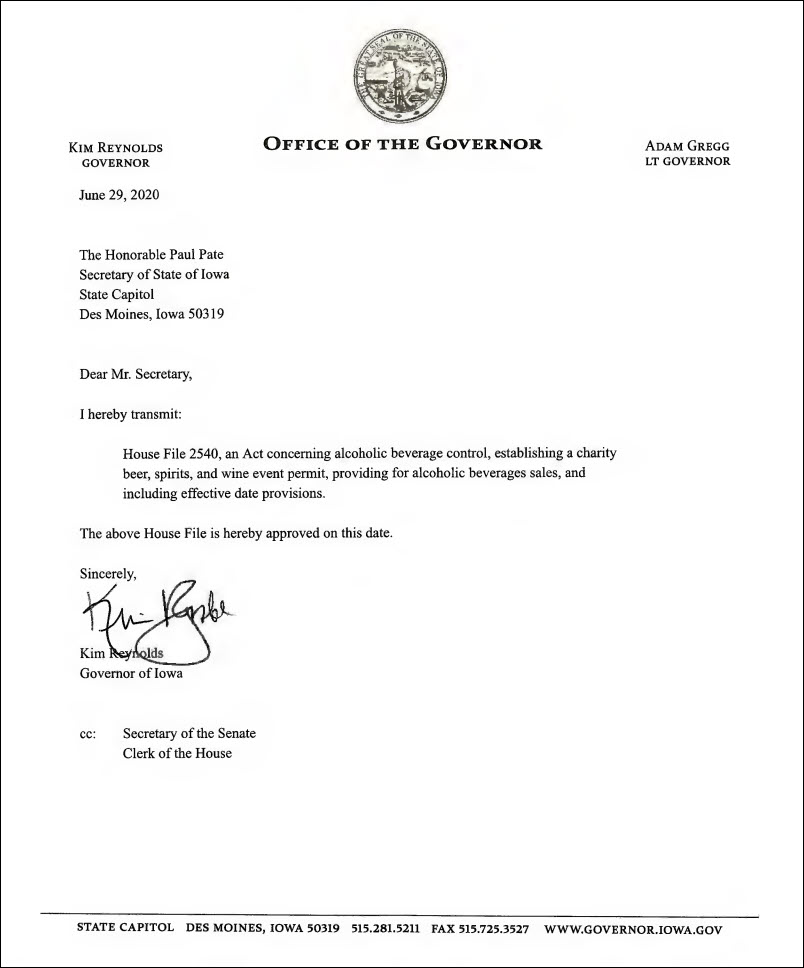 What Does the New Iowa Law Actually Say About Cocktails To-Go?
What Does the New Iowa Law Actually Say About Cocktails To-Go?

This is an excerpt from Iowa’s new cocktails to-go law. You can read the full text of HF 2540 here.
DIVISION III
ALCOHOLIC BEVERAGES SALES
Sec. 10. Section 123.30, subsection 3, paragraph c, subparagraph (1), Code 2020, is amended to read as follows;
(1) A class “C” liquor control license may be issued to a commercial establishment but must be issued in the name of the individuals who actually own the entire business and shall authorize the holder to purchase alcoholic liquors in original unopened containers from class “E” liquor control licensees only, wine from class “A” wine permittees or class wine permittees who also hold class “E” liquor control licenses only as provided in sections 123.173 and 123.177, and to sell alcoholic beverages to patrons by the individual drink for consumption on the premises only. However, alcoholic liquor, wine, and beer may also be sold for consumption off the premises. In addition, mixed drinks or cocktails may also be sold for consumption off the premises subject to the requirements of section 123.49, subsection 2, paragraph “d”. The holder of a class “C” liquor control license may also hold a special class “A” beer permit for the premises licensed under a class “C” liquor control license for the purpose of operating a brewpub pursuant to this chapter.
Sec. 11. Section 123.30, subsection 3, paragraph c, subparagraph (3), Code 2020, is amended to read as follows:
(3) A class “C” native distilled spirits liquor control license may be issued to a native distillery but shall be issued in the name of the individuals who actually own the business and shall only be issued to a native distillery which, combining all production facilities of the business, produces and manufactures not more than one hundred thousand proof gallons of distilled spirits on an annual basis. The license shall authorize the holder to sell native distilled spirits manufactured on the premises of the native distillery to patrons by the individual drink for consumption on the premises and mixed drinks or cocktails for consumption off the premises subject to the requirements of section 123.49, subsection 2, paragraph “d”. All native distilled spirits sold by a native distillery for on-premises consumption and mixed drinks or cocktails sold for consumption off the premises shall be purchased from a class liquor control licensee in original unopened containers.
Sec. 12. Section 123.43A, subsection 6, Code 2020, is amended to read as follows;
6. Notwithstanding any provision of this chapter to the contrary or the fact that a person is the holder of a class “A” native distilled spirits license, a native distillery which, combining all production facilities of the business, produces and manufactures not more than one hundred thousand proof gallons of native distilled spirits on an annual basis may sell those native distilled spirits manufactured on the premises of the native distillery for consumption on the premises by applying for a class “C” native distilled spirits liquor control license as provided in section 123.30. A native distillery may be granted not more than one class “C” native distilled spirits liquor control license. All native distilled spirits sold by a native distillery for on-premises consumption and mixed drinks or cocktails sold for consumption off the premises shall be purchased from a class liquor control licensee. A manufacturer of native distilled spirits may be issued a class “C” native distilled spirits liquor control license regardless of whether the manufacturer is also a manufacturer of beer pursuant to a class “A” beer permit or a manufacturer of native wine pursuant to a class “a” wine permit.
Sec. 13. Section 123.49, subsection 2, paragraph d. Code 2020, is amended by adding the following new subparagraph:
NEW SUBPARAGRAPH. (3) Mixed drinks or cocktails mixed on premises covered by a class liquor control license or a class “C” native distilled spirits liquor control license for consumption off the licensed premises may be sold if the mixed drink or cocktail is immediately sealed with a lid or other method of securing the product and is promptly taken from the licensed premises prior to consumption of the mixed drink or cocktail. A mixed drink or cocktail that is sold and sealed House File 2540, p. 8 in compliance with the requirements of this subparagraph shall not be deemed an open container subject to the requirements of sections 321.284 and 321.284A if the sealed container is unopened and the seal has not been tampered with, and the contents of the container have not been partially removed.
Sec. 14. Section 123.131, subsection 2, paragraph a. Code 2020, is amended to read as follows:
a. The beer is transferred from the original container to the container to be sold on the licensed premises at the time of sale or when sold by telephonic or other electronic means.
Sec. 15. EMERGENCY RULES. The alcoholic beverages division of the department of commerce may adopt emergency rules under section 17A.4, subsection 3, and section 17A.5, subsection 2, paragraph “b”, to implement the provisions of this division of this Act and the rules shall be effective immediately upon filing unless a later date is specified in the rules. Any rules adopted in accordance with this section shall also be published as a notice of intended action as provided in section 17A.4.
Sec. 16. EFFECTIVE DATE. This division of this Act, being deemed of immediate importance, takes effect upon enactment.
Stay Informed: Sign up here for the Distillery Trail free email newsletter and be the first to get all the latest news, trends, job listings and events in your inbox.
Please help to support Distillery Trail. Sign up for our Newsletter, like us on Facebook and follow us on Instagram and Twitter.



